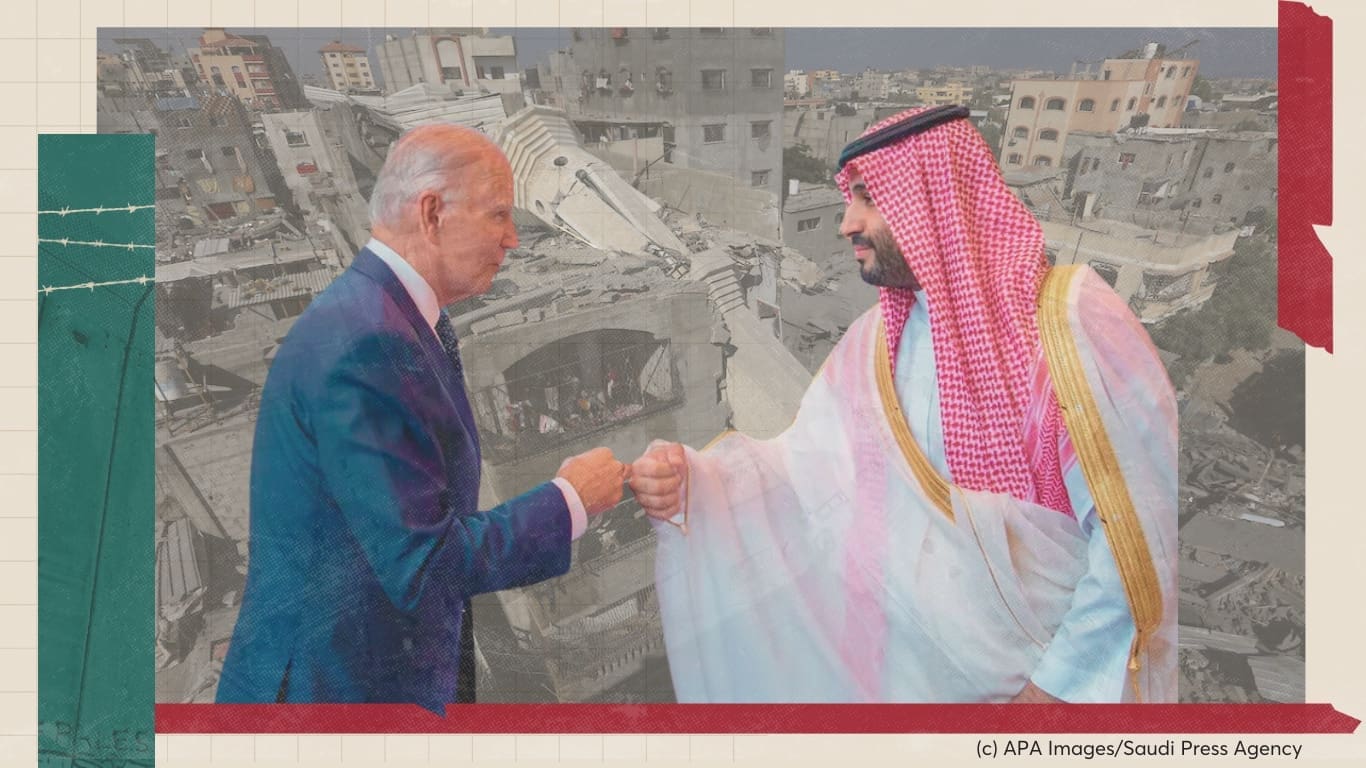
Amid the Israeli regime’s ongoing genocide in Gaza, high-stakes negotiations aimed at formalizing and upgrading the long-standing, covert relationship between Israel and Saudi Arabia persist. While attempting to draw the parameters of a ceasefire agreement, the Biden administration has likewise doubled down on efforts to broker a historic deal between the two countries.
This policy memo examines the mutually reinforcing interests of the US, Saudi Arabia, and Israel that fuel the prospective agreement. It interrogates Saudi’s feigned solidarity with the Palestinian struggle and situates the normalization deal within shifting regional dynamics.1
US and Israeli Interests: A Shifting Security Alliance
Washington has long aspired for Saudi Arabia to embrace Israel officially. The bipartisan Israel Relations Normalization Act, passed by Congress in March 2022, underscored this objective, mandating the State Department to further Arab normalization with Israel based on the Trump-era Abraham Accords.
The message to Saudi Arabia is clear: an Israeli alliance is a prerequisite for US protection Share on X
Among all possible partnerships, Saudi Arabia holds particular weight for both US and Israeli interests. The US is endeavoring to cement Israel as the preeminent military-economic linchpin of a US-led regional order. Within that order, Israel will serve as the hub for an anti-Iran coalition involving Saudi Arabia and other Abraham Accords partners. Thus, understanding Saudi-Israeli rapprochement as a calculated initiative to cultivate new security alliances amid increasing global power rivalries is critical.
A US-Saudi defense pact, which lies at the heart of ongoing normalization talks with Israel, speaks directly to this aim. The pact would commit the US to defend Saudi Arabia and expand Saudi’s access to US weapons. In doing so, the arrangement would strengthen US-Saudi military relations and simultaneously help to thwart Riyadh’s security cooperation with China. Regional interests notwithstanding, the US has conditioned any such agreement with Saudi Arabia on the latter’s normalization with Israel. Hence, the message to Saudi Arabia is clear: an Israeli alliance is a prerequisite for US protection.
Masking Saudi’s Abandonment of Palestine
The Saudi regime is ostensibly making a number of Palestine-related demands as part of the normalization negotiations. Riyadh’s stipulations reportedly include a permanent ceasefire in Gaza and a “pathway” to Palestinian statehood. The timeline for statehood is not clear, however, and the Israeli regime would certainly place conditions on the agreement that would allow indefinite postponement of such a move.
Saudi Arabia’s attempt to tie Israeli normalization with Palestinian statehood is undoubtedly designed to provide political cover from those who may argue that the kingdom has abandoned the Palestinian cause. In reality, normalization with Israel would be a continuation—not the start—of Saudi’s desertion of the Palestinian struggle and its de facto acceptance of the Israeli settler-colonial status quo.
Normalization with Israel would be a continuation—not the start—of Saudi's desertion of the Palestinian struggle Share on X
Indeed, the fruits of Saudi’s decades-long informal relationship with the Israeli regime can currently be seen through its crackdown on domestic solidarity with Palestine and amplification of anti-Palestinian propaganda in its media coverage of the genocide. The new Saudi school curriculum has even gone so far as to scrub the name “Palestine” from maps in school textbooks.
Despite this systematic effort to reshape public understanding of Israeli settler colonialism, the Saudi regime faces an uphill battle in trying to sway its population. A recent survey by the Arab Center for Research and Policy Studies found that 95% of the Saudi public consider the Palestinian cause as a central Arab issue. A 2023 poll by the pro-Israel Washington Institute for Near East Policy likewise indicated that 96% of Saudi citizens are opposed to normalization and believe Arab countries should cut all ties with Israel.
Joining the Abraham Accords
If a Saudi-Israeli normalization deal goes ahead, it will likely be incorporated into the expansive Abraham Accords framework. Saudi Arabia’s formal entry into this scheme carries far-reaching and dangerous ramifications for Palestine and the broader region. Indeed, the kingdom’s immense financial clout and symbolic weight in the Arab and Muslim worlds could catalyze a domino effect. Through economic incentives or political pressure, Saudi participation may compel other Arab and Muslim nations to join this growing alliance.
Even if a formal Saudi-Israeli normalization deal remains pending until after the next US president assumes office in 2025, Saudi Arabia’s determined push to legitimize a widely-condemned regime stands as a pursuit utterly divorced from global realities. And while much of the world has awoken to Israel’s genocidal and colonial aims, Riyadh’s dogged willingness to proceed with such normalization obliterates any pretense of rational and strategic calculations, let alone solidarity with the Palestinian cause.
- To read this piece in French, please click here. Al-Shabaka is grateful for the efforts by human rights advocates to translate its pieces, but is not responsible for any change in meaning.








